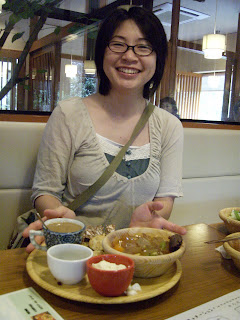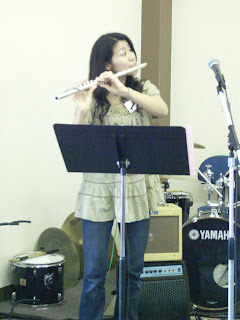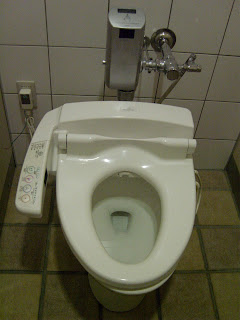In the Japanese dramas, the way Japanese people, regardless of the gender, slurp
ramen at a restaurant used to impress us. As soon as the hot dishes were served, the clients would pull the long noodles with their chopsticks and suck up to the end as if they could swallow without chewing.
Six years ago, when Dad finally went to Tokyo, he was amused by the scenes whereby Japanese men formally dressed in coats with neckties were eating their
ramen at the roadside. Indeed,
ramen, originated from China and modified to suit the Japanese taste, had no doubt become one of the most popular dishes among the travellers in Japan.
During our two-week stay in Japan this year, I tasted
ramen at four places.
In Malaysia, we usually have a choice between noodles seasoned with a sauce, accompanied by a bowl of soup and the same noodles in a bowl of soup. At the food court inside a shopping mall where I had my first
ramen,

the difference was the soup base:
shoyuu or
miso.

The second time, we went to a famous chained
ramen-ya at the peak lunch hour. Young people were queueing outside the restaurant which only boasted of about ten seats at a bar and three or four tables. So we did some shopping at a supermarket behind the restaurant before getting available seats.

While we were waiting for our noodles to be served, Emi told me, "Nowadays in Japan, many young people's dream is to own a 'ramen' restaurant."
The speciality there was thick noodles served either cool or hot, accompanied a soup with a lot of ingredients, namely dried seaweed, sliced pork, half of a hard-boiled egg, etc.

In Malaysia, I was so used to finishing everything in my bowl. When Emi commented that she was surprised at my ability to drink almost all the soup, I realized the very salty broth was only meant to be dipped with the noodles. No wonder free icy plain water and hot green tea were served at most of the eateries to quench the thirst of the customers after a high intake of sodium.
The third time, we popped into a restaurant after seeing that our first choice was closed in the middle of the afternoon.

We were sitting side by side at a bar. Right in front of us and behind the transparent plastic curtains was the kitchen. It was interesting to witness the preparation of the food without making the cook uncomfortable.

We ordered five
ramen and two plates of five fried dumplings.

The cheapest
ramen would cost 300 yen on Fridays between 3pm-6pm instead of 450 yen during other times.
The last place was Seng's favorite since his last visit two years ago. He specially requested to go to this
ramen-ya, previously a petrol station.

This time, I ordered a
tonkotsu ramen. Chopped fresh leek added a nice colour to the white, milky soup base.

In Malaysia, I was taught to focus on my bowl while eating, though sometimes I still do not bear to switch off the television. In France, I learned to discuss with others at the dining table. In Japan, comics are so widely available in
ramen restaurants that clients seem to be encouraged to place their eyes on the book rather than the food.

In Malaysia, I was criticized for unconsciously making noise while eating, especially since I am a female. In France, I learned to give compliments to the food at the dining table. In Japan, the chewing sound is impolite but the slurping from the
ramen eater is a must. I suppose it is a way to show how much the Japanese love
ramen.
How much do Malaysians love
ramen? Just look at my two brothers who were almost washing their faces with
ramen...





















































